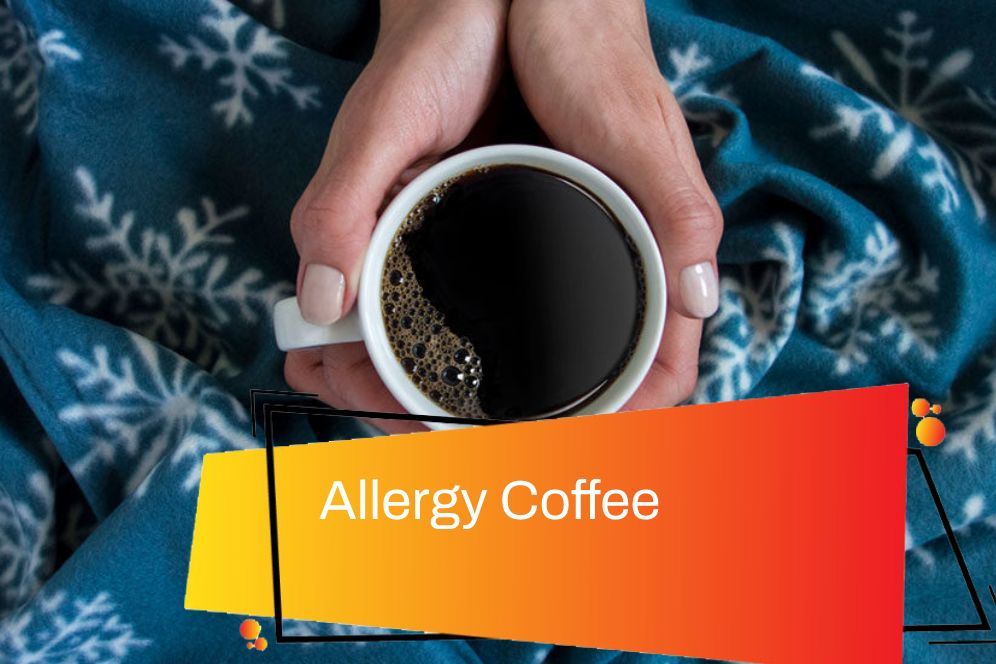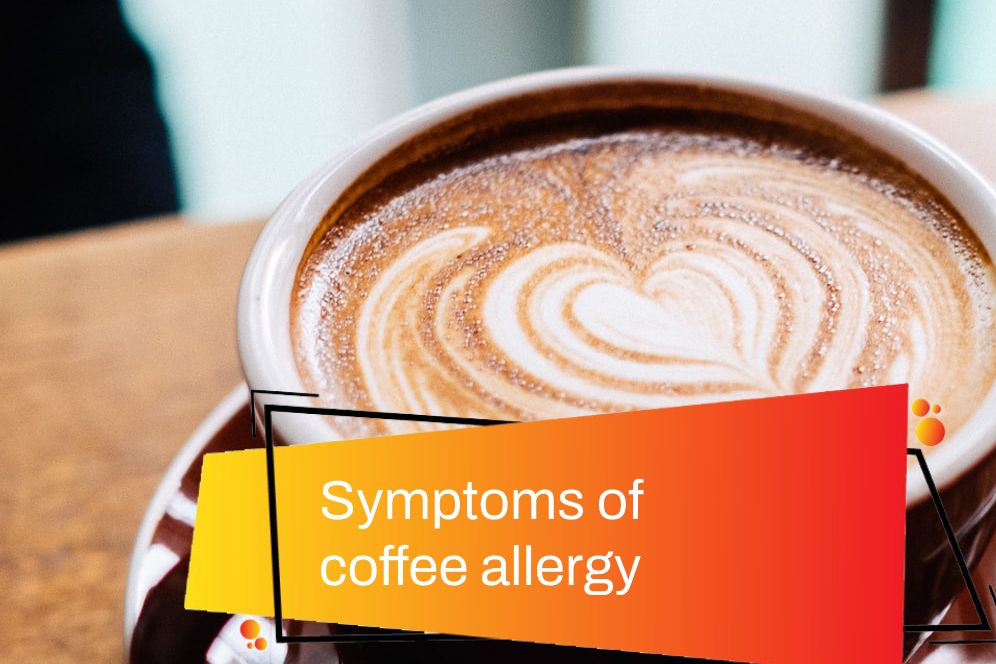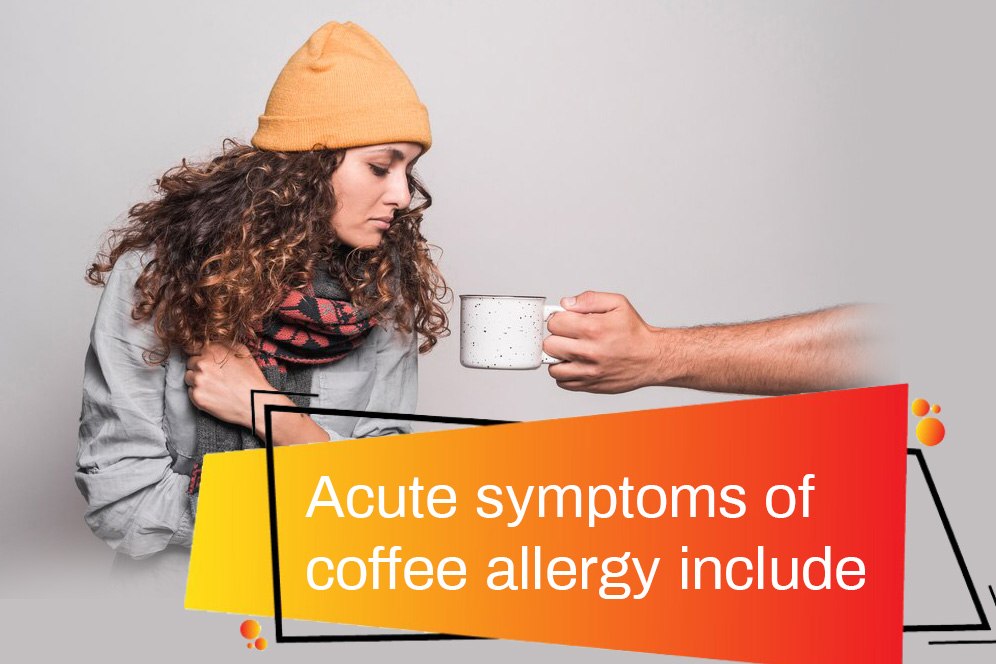Caffeine Allergy & Coffee Intolerance [Causes, Symptoms, and Solutions]

Coffee is a favorite beverage of many people around the world. People with coffee allergies react when exposed to coffee beans.
People may experience coffee allergies with feelings of anxiety, restlessness, or irritability after drinking coffee.
People who do not consume caffeine regularly or are sensitive to caffeine may also experience symptoms after consuming relatively small amounts of caffeine, such as 1 cup of coffee or tea.
Caffeine is a major cause of coffee allergies. What is a coffee allergy? What is the cause? And how is it solved? A coffee allergy occurs when the substances in coffee have an unexpected effect on the body.
You should avoid caffeinated foods and beverages if you have symptoms of allergies.
Contents
- 1 What is a coffee allergy?
- 2 Symptoms of coffee allergy
- 3 Acute symptoms of coffee allergy include
- 4 What are the causes of coffee intolerance?
- 5 Coffee substitute
- 6 Can you suddenly develop a caffeine intolerance?
- 7 How do you test for caffeine sensitivity?
- 8 Who should not drink caffeine?
- 9 Caffeine allergy treatment
- 10 Caffeine allergy test
- 11 Caffeine sensitivity with age
- 12 Caffeine sensitivity after COVID
- 13 Why am I suddenly sensitive to caffeine
- 14 Does caffeine make you itchy at night
- 15 How long does it take to get rid of caffeine intolerance?
What is a coffee allergy?
Coffee enters the bloodstream 15 minutes after reaching the stomach. Then the effects on the body begin to be observed. It narrows the arteries leading to the brain, and the brain perceives this as a threat.
It can be said that people who feel nauseous after consuming coffee and show symptoms such as itchy skin, dry mouth, and tingling in the mouth are allergic to coffee.
If a person is allergic to caffeine, these symptoms will appear within an hour of consuming caffeine.
“You can enjoy hot beverages beyond coffee. Learn about these beverages by reading the following article:
coffee substitute
Symptoms of coffee allergy
How to diagnose coffee allergy? A true coffee allergy can cause severe symptoms in the body, usually in the first hours of contact. Symptoms can affect many parts of the body and usually get worse over time.
Acute symptoms of coffee allergy include
Skin rashes such as urticaria or red spots on the skin,
Coffee-induced stomachache: The production of acid in the stomach, which is stimulated by drinking coffee, not only causes stomach problems but also causes heartburn.
Nausea and vomiting: Coffee nausea can be accompanied by a feeling of tremor in the body.
Difficulty swallowing,
Shortness of breath or difficulty breathing,
Cough or wheeze,
Stomach or abdominal cramps,
Diarrhea,
Decreased skin color,
Weak pulse or a sudden drop in blood pressure,
Dizziness or loss of consciousness.
read more: Effects Of Drinking Coffee In Ms
Anyone experiencing any of these symptoms should seek medical attention immediately.
Coffee allergies can cause symptoms, but they are not usually life-threatening:
Tension and calm, feelings of corruption,
Irritability
Anxiety,
Difficulty sleeping or insomnia,
nausea,
Abdominal cramps,
Heart rate or high blood pressure: Another symptom of coffee intolerance is palpitations after coffee. First of all, coffee stimulates the heart and blood circulation.
Abnormal muscle spasm.
What is good for coffee allergies and how?
People with coffee allergies may see an allergist and request tests and analyzes. If you are found to be allergic to coffee, you should eliminate coffee from your life or reduce it significantly.
If coffee allergy is caused by another ingredient in coffee, you should avoid it. Before eating cookies or cakes, make sure there is no coffee in them.
People who are allergic to the compounds in coffee may also be allergic to some products. These people should avoid the following products.
- Types of coffee,
- Energy drinks,
- Types of tea such as white tea,
- Gassy drinks
- Non-alcoholic beverage,
- Types of chocolate,
- Those who are sensitive to the ingredients in coffee should avoid all foods containing
- cocoa powder.
What are the causes of coffee intolerance?
Caffeine intolerance:
For many people who can not tolerate coffee, the caffeine in coffee is to blame.
Coffee on an empty stomach:
Drinking coffee on an empty stomach can cause stomach pain or nausea after coffee. This is because an empty stomach can have trouble processing the stomach acid produced by coffee in the morning.
Coffee substitute
- There are several hot drinks that you can use instead of coffee.
- Herbal teas with different flavors that are hot and decaffeinated,
- White coffee
- Combination of hot water, chopped ginger root, fresh lemon juice and honey,
- And of course decaffeinated coffee.
Can you suddenly develop a caffeine intolerance?
Yes, it is possible for someone to suddenly develop a caffeine intolerance, although it is relatively rare. A caffeine intolerance is a condition where a person experiences unpleasant symptoms after consuming even small amounts of caffeine, such as jitteriness, headaches, nausea, heart palpitations, or anxiety.
Some possible reasons why someone might suddenly develop a caffeine intolerance include changes in their body’s ability to metabolize caffeine, changes in the balance of their gut microbiome, changes in hormone levels, or changes in the way their body processes other medications or substances. It is also possible that someone who has never had a problem with caffeine before may develop an intolerance due to exposure to high levels of stress or other environmental factors.
If you are experiencing symptoms after consuming caffeine, it is recommended that you speak with a healthcare professional to determine if a caffeine intolerance or other condition may be the cause. They can help you to identify the root cause of your symptoms and provide guidance on how to manage them.
How do you test for caffeine sensitivity?
There is no specific test to diagnose caffeine sensitivity or intolerance, as it is typically based on self-reported symptoms and individual tolerance levels. However, there are a few ways you can assess your response to caffeine:
Elimination test: One way to determine if you have a caffeine sensitivity or intolerance is to eliminate caffeine from your diet for a period of time (at least a week) and then reintroduce it to see if you experience any symptoms. This can help you determine if your symptoms are related to caffeine or something else.
Tracking your symptoms: Keep a record of your symptoms after consuming caffeine. This can help you determine if you experience symptoms consistently and whether the symptoms are related to caffeine or something else.
Genetic testing: Some companies offer genetic testing that can identify whether an individual is more likely to be sensitive to caffeine based on their genes.
It’s important to note that caffeine sensitivity and tolerance can vary widely among individuals, so what may be considered a “normal” dose for one person may cause symptoms in another. If you are experiencing symptoms after consuming caffeine, it’s always a good idea to speak with a healthcare professional to rule out any underlying medical conditions and to determine the best course of action.
Who should not drink caffeine?
While caffeine is generally safe for most people, there are some groups of people who may want to limit or avoid caffeine intake altogether. These include:
Pregnant women: Consuming high levels of caffeine during pregnancy has been linked to an increased risk of miscarriage and low birth weight. The American College of Obstetricians and Gynecologists recommends that pregnant women limit their caffeine intake to no more than 200 milligrams per day, which is roughly the amount in one 12-ounce cup of coffee.
Breastfeeding women: Caffeine can pass into breast milk, so breastfeeding women may want to limit their intake to no more than 300 milligrams per day.
Children and adolescents: Because their bodies are still developing, children and adolescents may be more sensitive to the effects of caffeine, including increased heart rate, nervousness, and insomnia. The American Academy of Pediatrics recommends that children and adolescents consume no more than 100 milligrams of caffeine per day.
People with certain medical conditions: Caffeine can interact with certain medications and can worsen symptoms of anxiety, insomnia, and heart conditions. People with high blood pressure, heart arrhythmias, or panic disorder may want to limit their caffeine intake or avoid it altogether.
Individuals who are sensitive to caffeine: Some people may be more sensitive to the effects of caffeine than others and may experience negative side effects such as jitteriness, anxiety, and insomnia even at low doses.
If you are unsure if caffeine is safe for you, it’s always a good idea to speak with a healthcare professional.
Caffeine allergy treatment
Caffeine allergy is rare, but it is possible. Symptoms of caffeine allergy can include hives, swelling of the lips, tongue, or throat, difficulty breathing, and even anaphylaxis in severe cases.
If you suspect that you have a caffeine allergy, the first step is to avoid all sources of caffeine, including coffee, tea, chocolate, energy drinks, and some medications. If you experience severe symptoms, such as difficulty breathing, seek medical attention immediately.
If you have been diagnosed with a caffeine allergy, treatment may involve the use of antihistamines to help relieve symptoms such as itching, hives, and swelling. In severe cases, a doctor may prescribe an epinephrine auto-injector (EpiPen) to be used in case of a severe allergic reaction.
It’s important to note that caffeine allergy is rare, and most people who experience negative effects after consuming caffeine are actually experiencing caffeine sensitivity or intolerance. If you are experiencing symptoms after consuming caffeine, it’s a good idea to speak with a healthcare professional to determine the cause and the best course of treatment.
Caffeine allergy test
Caffeine allergy is rare, and there is no specific test to diagnose caffeine allergy. However, if you are experiencing symptoms after consuming caffeine, your doctor may recommend allergy testing to determine if you have an allergy to other substances that are commonly found in foods and beverages that contain caffeine, such as chocolate or tea.
The most common method of allergy testing is skin prick testing, which involves placing a small amount of an allergen extract on your skin and then pricking or scratching the skin to allow the extract to enter the skin. If you have an allergy to the substance, you may develop a raised bump or hive at the site of the test.
Another form of allergy testing is a blood test that measures the levels of antibodies to specific allergens in your bloodstream. This test is often used in combination with skin prick testing to confirm a diagnosis.
If you suspect that you have a caffeine allergy, it’s important to speak with a healthcare professional who can help you determine the cause of your symptoms and recommend the appropriate course of action. It’s important to note that many people who experience negative effects after consuming caffeine are actually experiencing caffeine sensitivity or intolerance, which are different from an allergy.
Caffeine sensitivity with age
Caffeine sensitivity can change with age, as the body’s ability to metabolize caffeine can decrease over time. As we age, our liver function may decline, and this can affect the way our body processes caffeine. In addition, older adults may also have a lower tolerance for caffeine due to changes in their metabolism or changes in the way that caffeine affects their nervous system.
Research suggests that caffeine sensitivity tends to decrease with age, with older adults reporting fewer side effects from caffeine than younger adults. However, this can vary widely from person to person, and some older adults may still be sensitive to caffeine.
It’s also worth noting that older adults may be more vulnerable to some of the negative effects of caffeine, such as insomnia, anxiety, and increased heart rate. As a result, healthcare professionals may recommend that older adults limit their caffeine intake or avoid it altogether, especially if they have certain medical conditions.
If you are an older adult and are experiencing negative effects after consuming caffeine, it’s a good idea to speak with a healthcare professional who can help you determine the cause of your symptoms and recommend the appropriate course of action.
Caffeine sensitivity after COVID
There is currently limited research on the relationship between caffeine sensitivity and COVID-19. However, some people who have recovered from COVID-19 report changes in their sense of taste and smell, which could potentially affect their ability to tolerate the taste of coffee or other caffeinated beverages.
Additionally, COVID-19 can cause a range of symptoms that affect the respiratory and nervous systems, and some of these symptoms may be exacerbated by caffeine. For example, caffeine can increase heart rate and blood pressure, which may be particularly concerning for people who have experienced heart or lung damage as a result of COVID-19.
If you have recently recovered from COVID-19 and are experiencing negative effects after consuming caffeine, such as increased heart rate, nervousness, or insomnia, it’s a good idea to speak with a healthcare professional who can help you determine the cause of your symptoms and recommend the appropriate course of action.
It’s also worth noting that if you are experiencing long-term symptoms after recovering from COVID-19, such as fatigue, brain fog, or difficulty concentrating, caffeine may not be the best solution for managing these symptoms. In fact, consuming caffeine can sometimes exacerbate these symptoms, and it’s important to speak with a healthcare professional about other strategies for managing your symptoms.
Why am I suddenly sensitive to caffeine
There are several reasons why you may suddenly become sensitive to caffeine. Here are a few possibilities:
- Change in metabolism: As we age, our metabolism changes, and this can affect the way our body processes caffeine. This means that you may become more sensitive to caffeine as you get older.
- Change in caffeine tolerance: If you consume caffeine regularly, your body may build up a tolerance to it over time. However, if you stop consuming caffeine for a period of time and then resume, your tolerance may decrease, making you more sensitive to its effects.
- Medical conditions: Certain medical conditions, such as anxiety disorders, heart conditions, and gastrointestinal issues, can make you more sensitive to caffeine.
- Medications: Some medications can increase the effects of caffeine, making you more sensitive to its effects. For example, certain antidepressants, antibiotics, and asthma medications can interact with caffeine in this way.
- Genetics: Some people may have a genetic predisposition to caffeine sensitivity, meaning that they are more likely to experience negative effects from caffeine.
If you are suddenly experiencing negative effects after consuming caffeine, it’s a good idea to speak with a healthcare professional who can help you determine the cause of your symptoms and recommend the appropriate course of action. It may be helpful to keep a food diary to track your caffeine intake and any symptoms you experience, as this can help you and your doctor identify patterns and potential triggers.
Does caffeine make you itchy at night
Caffeine itself is not known to cause itching at night. However, consuming caffeine late in the day or evening can disrupt your sleep, and poor sleep quality can sometimes cause itching. Itching can also be caused by a wide range of factors, including dry skin, allergies, certain medications, and medical conditions such as eczema or psoriasis.
If you are experiencing itching at night, it’s important to speak with a healthcare professional who can help you determine the underlying cause of your symptoms and recommend the appropriate course of action. They may recommend lifestyle changes such as avoiding caffeine in the evening, or they may suggest other treatments depending on the cause of your itching.
How long does it take to get rid of caffeine intolerance?
The timeline for resolving caffeine intolerance can vary depending on the severity of your symptoms and the underlying cause of your intolerance. In some cases, simply reducing your caffeine intake may be enough to improve your symptoms, and you may start to feel better within a few days or weeks.
However, if you have developed a more severe caffeine intolerance or have an underlying medical condition that is contributing to your symptoms, it may take longer to see improvement. In some cases, it may be necessary to completely avoid caffeine for a period of time to allow your body to heal and recover.
It’s important to work closely with a healthcare professional if you are experiencing caffeine intolerance or other negative effects after consuming caffeine. They can help you determine the cause of your symptoms and recommend the appropriate course of action, which may include lifestyle changes, medications, or other treatments. They can also help you develop a plan for gradually reintroducing caffeine into your diet if and when it is appropriate to do so.














